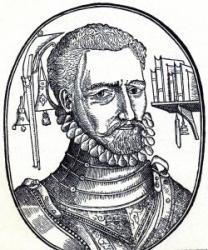|
Short Name: |
George Gascoigne |
|
Full Name: |
Gascoigne, George, 1525-1577 |
|
Birth Year: |
1525 |
|
Death Year: |
1577 |
Gascoigne, George, son and heir of Sir John Gascoigne. The date and place of his birth are unknown, but it is probable that he was born about 1525, and from a statement in the Address to Queen Elizabeth prefixed to one of his works, he seems to have spent a part of his early life in Westmoreland. He was educated at Trinity College, Cambridge, from whence he entered the Middle Temple as a student of law before 1548; but neglecting his studies he led a life of reckless extravagance and dissipation, on account of which he was disinherited by his father. In 1555 he migrated to Gray's Inn, but seems to have left it also. In 1557-58 he represented Bedford in Parliament. In 1565 he returned to Gray's Inn, and there, in the following year, two plays by him were represented, The Supposes, translated from the Italian of Ariosto, and Jocasta, adapted from the Phoenissae of Euripides. To the latter Gascoigne contributed three acts. In 1572 he was returned to Parliament as member for the borough of Midhurst: but objections being made to his character he appears not to have taken his seat, and not long afterwards went to the Low Countries and took service with William of Orange, from whom he received a captain's commission. His gallant conduct in the field obtained the favourable notice of that Prince, but after some time he was taken prisoner by the Spaniards and sent back to England.
During Gascoigne's absence his first book, A Hundredth sundrie Floures bound up in one small Poesie, the manuscript of which he had left in the hands of a friend, was printed in 1572 or 1573 without his permission, and after his return from Holland, he published in 1575 a corrected and enlarged edition of his Poesies. Thenceforward he seems to have led a literary life, and is said to have been in some way attached to the court. On the occasion of Elizabeth's celebrated visit to Kenilworth in the summer of 1575, Gascoigne was commissioned by Leicester to devise the masques, &c, performed for the Queen's entertainment. He died at Stamford, Lincolnshire, Oct. 7, 1577, and was probably buried by his friend George Whetstone in the family vault of the Whetstones at Barnack, but this id not certainly known. At some time between 1558 and 1568 Gascoigne married Elizabeth Breton, mother, by her first husband, of the poet Nicholas Breton, and by her had a son. His widow survived until 1585. Gascoigne is noticeable as being one of the earliest English dramatists, the first English satirist, and the first English critic in poetry. In 1869 his poems were collected and edited for the Roxburghe Library by W. C. Hazlitt, and in 1868 his Notes of Instruction in English Verse; The Steele Glas; and The Complaynt of Philomene were included in English reprints edited by Edward Arber, together with Whetstone's metrical life of Gascoigne. To modern hymnody he is known by "We that have passed in slumber sweet," an altered version of his morning hymn, "Ye that have spent the silent night;" and other religious poems. [George Arthur Crawford, M.A.]
-- John Julian, Dictionary of Hymnology (1907)
George Gascoigne (c. 1535 – 7 October 1577) was an English poet, soldier and unsuccessful courtier. He is considered the most important poet of the early Elizabethan era, following Sir Thomas Wyatt and Henry Howard, Earl of Surrey and leading to the emergence of Philip Sidney. He was the first poet to deify Queen Elizabeth I, in effect establishing her cult as a virgin goddess married to her kingdom and subjects. His most noted works include A Discourse of the Adventures of Master FJ (1573), an account of courtly intrigue and one of the earliest English prose fictions; The Supposes, (performed in 1566, printed in 1573), an early translation of Ariosto and the first comedy written in English prose, which was used by Shakespeare as a source for The Taming of the Shrew; the frequently antholo
Wikipedia Biography


 My Starred Hymns
My Starred Hymns



